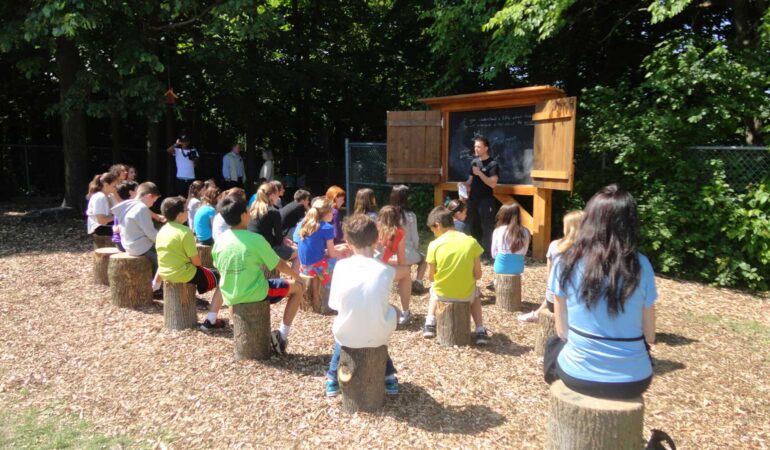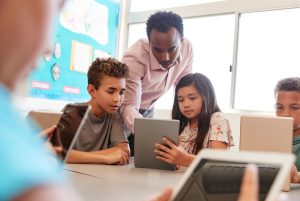
Outdoor Education for Inclusive Learning
Course Description
This course examines “Outdoor Education” as a primary approach within inclusive learning, providing educators with innovative methods to effectively include students with various needs. Participants will explore how outdoor activities can serve as powerful tools in inclusive education, examining strategies to enhance accessibility and foster connections. Practical activities conducted in natural environments will enable educators to create interactive experiences that encourage all students to actively participate in the learning process.
Throughout the course, practical activities will be designed to strengthen students’ social connections, promote collaboration, and ensure every child’s participation in education. Additionally, eco-focused exercises will support the inclusive education framework, fostering empathy, responsibility, and a deeper connection to nature while providing practical strategies aligned with inclusive education goals.
Course Methodology
- Interactive and Collaborative Learning: Participants learn together through group work and activities, promoting the development of social skills and the formation of an inclusive learning environment.
- Practical Activities: Alongside theoretical knowledge, practical activities conducted in nature allow participants to learn in real-life contexts, facilitating the application of learned information.
- Group Discussions and Feedback: Daily group discussions and feedback sessions help participants share their experiences and reinforce their learning.
Course Objectives
- Inclusive Education Practices: Equip participants with the skills to design and implement outdoor activities that encompass students with diverse needs.
- Accessibility Strategies: Ensure educators acquire the knowledge and skills necessary to make outdoor activities accessible.
- Collaboration and Social Connections: Help participants enhance their collaborative learning experiences.
- Eco-Education Practices: Increase environmental awareness by integrating eco-education principles with outdoor activities.
- Project Development: Develop participants’ competencies in designing activities aligned with inclusive education goals.
Learning Outcomes
- Activity Design: Participants will be able to plan and implement activities aligned with inclusive education goals.
- Accessibility Knowledge: Participants will gain the ability to identify and apply accessibility strategies in outdoor settings.
- Collaboration Skills: Participants will conduct activities that strengthen group collaboration and social interaction.
- Eco-Education Awareness: Participants will integrate eco-education practices into outdoor activities.
- Implementation Competency: Participants will possess the skills to successfully present and assess their designed activities.
Tentative daily programme
Day 1: Introduction and Key Concepts
- Opening and Introductions: Activities to enhance interaction among participants.
- Importance of Inclusive Education and Outdoor Education: Collaborative group discussions and brainstorming.
- What is Eco-Education? Exploration of concepts through group work in nature.
- First Experience of Outdoor Activities: Participants learn through observation in nature.
Day 2: Accessibility and Participation
- Principles of Accessibility: Developing accessibility strategies through practical scenarios.
- Designing Accessible Outdoor Activities: Planning activities in small groups.
- Access Strategies in Outdoor Environments: Observation and application during a field trip.
- Outdoor Activity: Nature Walk and Observation: Participants observe and analyze the environment.
Day 3: Collaboration and Social Connections
- Collaborative Learning Approaches: Developing collaboration skills through practical group games.
- Teamwork Games: Activities in nature that promote cooperation.
- Development of Social Skills: Role-playing activities and group discussions.
- Outdoor Activity: Group Games: Nature activities that strengthen teamwork and social connections.
Day 4: Eco-Education and Connection to Nature
- Applications and Effects of Eco-Education: Group work and discussions.
- Nature Walk: Observation and exploration activities in nature.
- Eco-Focused Education Plans: Strategy development workshop in groups.
- Empathy-Building Activities: Interactive group activities in nature to enhance empathy.
Day 5: Project Presentations and Assessment
- Participant Project Presentations: Implementation and presentation of activities designed by groups.
- Feedback and Discussion: Peer assessment and constructive feedback sessions.
- Opportunities for Inclusive Learning: Collaborative panel discussion.
At the End of the Course
- Participants will receive their certificates.
- Participants will provide a general evaluation of the course and complete the event survey.
- Participants will receive course materials, videos, photos, and PDF documents in both digital and print formats.
Follow-up and Support
After the course, participants will receive all course materials both digitally and in print. An email group will be created for idea exchange, and self-evaluation materials will be provided.
*Please note that course activities and content may vary depending on participants’ preferences and the instructor leading the session. Any changes to the course are at the discretion of the instructor. If there is a specific topic you would like to include in the course content, please let us know in advance.
Example Outdoor Activity: ``Nature Treasure Hunt``
Activity Name: Nature Treasure Hunt
Objective: To develop participants’ collaboration, communication, and social skills, while increasing interaction with nature.
Materials:
- Maps
- Nature objects (e.g., leaves, stones, flowers)
- Notebooks and pens
- Treasure list (a list of objects to find)
Activity Process:
-
-
Preparation:
-
- Participants are divided into small groups. Each group receives a map and a copy of the treasure list.
- They will go on an exploration to find the objects on the treasure list
-
Exploration Process:
-
- Groups move together to designated areas using the map.
- They attempt to find the items on the treasure list (e.g., different types of leaves, a specific stone, or an interesting flower).
- Each group can draw or photograph the objects they find in their notebooks.
-
Feedback and Sharing:
-
- After the allotted time (e.g., 1 hour), groups gather at a designated area to share their findings and experiences.
- Each group presents the objects they found and discusses how they communicated during their collaboration.
-
Evaluation:
-
- At the end of the activity, participants reflect on their collaboration and communication skills.
- They discuss which strategies worked, what challenges they faced, and evaluate their social skills.
Conclusion: This activity allows participants to actively collaborate in nature, strengthening their social connections and enriching their shared learning experiences.
Course Info
- Duration: 5 Days
- Location: All Location
- Cost: € 80-Day
- Certificate: Yes
- Prerequisites: No











